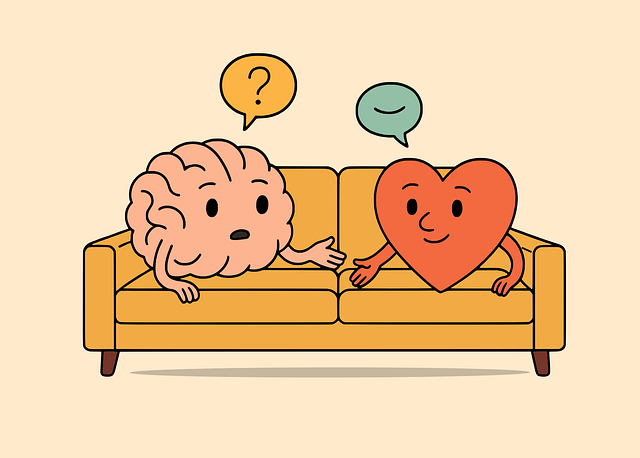Family mental health therapy through counseling addresses emotional challenges within the family unit, improving overall well-being. Structured sessions foster open communication, resolve conflicts, teach coping strategies, and strengthen family bonds. This collaborative approach empowers families to manage stress and emotional difficulties collectively, creating a more harmonious home environment. Regular involvement of all family members ensures success in mental health counseling, measured through improvements in dynamics, communication, and overall mental well-being.
Family mental health therapy is a transformative approach to addressing and improving collective well-being. By bringing family members together in collaborative counseling sessions, this holistic method tackles interconnected mental health issues. Through open communication, tailored strategies, and consistent engagement, families build stronger connections while identifying and addressing individual needs.
This comprehensive guide explores the multifaceted benefits of family mental health therapy, offering insights into understanding, implementing, and measuring its success through various practical steps.
Understanding Family Mental Health Therapy

Family mental health therapy, also known as family counseling or psychotherapy, is a specialized form of mental health counseling that focuses on improving relationships and addressing emotional challenges within the family unit. It recognizes that family dynamics significantly influence an individual’s mental well-being and vice versa. By creating a safe and supportive environment, therapists help families enhance communication, resolve conflicts, and develop healthier ways of interacting with one another.
This therapeutic approach involves sessions where all family members can participate, fostering open dialogue and encouraging each individual to express their thoughts and feelings. Therapists facilitate understanding between family members, teach coping strategies, and provide tools for managing stress and emotional difficulties as a collective. The ultimate goal is to strengthen the family’s resilience, improve overall mental health, and promote a more harmonious household environment.
Benefits of Collective Counseling Sessions

Collective counseling sessions, also known as family therapy, offer a unique and beneficial approach to mental health counseling. By bringing all family members together, therapists create a safe space for open communication, fostering better understanding among family members. This collaborative environment allows each individual to express their feelings, fears, and concerns while receiving immediate feedback and support from others in the group. Such sessions empower families to navigate challenges collectively, strengthening their bonds and improving overall mental well-being.
These sessions provide a platform for learning effective coping strategies and problem-solving skills, which can be practiced and refined within the supportive system of the family unit. Through collective counseling, families gain valuable insights into each other’s perspectives, promoting empathy and resilience. This holistic approach not only addresses individual mental health concerns but also strengthens the family’s overall ability to face and overcome adversity, creating a more harmonious and nurturing environment for all members.
Building Strong Family Connections Through Therapy

Family mental health therapy serves as a powerful tool for fostering strong connections within families. Through structured sessions led by trained professionals, family members learn effective communication strategies, enhance emotional understanding, and develop coping mechanisms tailored to their unique dynamics. This therapeutic process encourages everyone involved to express themselves openly, addressing underlying issues that may have been previously unspoken.
By participating in mental health counseling, families can navigate complex relationships, resolve conflicts, and strengthen bonds. The resulting environment of trust and empathy enables each member to feel valued and supported. Over time, these improved connections can lead to better problem-solving skills, increased resilience, and a deeper sense of unity, creating a more harmonious home life for all.
Identifying and Addressing Individual Needs

In family mental health therapy, one of the key aspects is recognizing and addressing individual needs within the dynamic of a family unit. Each family member may have distinct challenges and unique circumstances that contribute to their overall well-being. Mental health counseling plays a pivotal role in uncovering these individual needs by creating a safe space for open communication. Through careful assessment and active listening, therapists can identify specific issues affecting each person, whether it’s anxiety, depression, or difficulty with interpersonal relationships.
By addressing these individual needs, family therapy becomes tailored and effective. Counselors work collaboratively with each family member to develop personalized strategies and coping mechanisms that cater to their distinct requirements. This holistic approach ensures that everyone receives the mental health support they need, fostering a stronger, more resilient family unit as a result.
Creating a Safe Space for Open Communication

Creating a safe space is paramount in family mental health therapy. It fosters open communication, allowing each family member to express their feelings and concerns freely, without fear of judgment or repercussions. This environment encourages active participation, ensuring everyone involved feels heard and understood. Mental health counseling techniques are tailored to build trust and promote vulnerability, enabling the family to navigate sensitive topics together.
A safe space also facilitates honest discussions about emotional challenges and triggers within the family dynamic. By addressing these issues openly, families can develop coping strategies, enhance their problem-solving skills, and strengthen their support systems. This process is instrumental in improving overall mental well-being and fostering a deeper sense of unity among family members.
Strategies for Consistent Family Engagement

Engaging and involving the entire family in mental health counseling is a vital aspect of successful therapy. One effective strategy is to create structured family sessions where everyone has a chance to share their thoughts and feelings. These sessions can be scheduled regularly, ensuring consistency and allowing for progressive improvements. During these meetings, it’s beneficial to encourage open communication by using techniques like active listening and non-judgmental attitudes, fostering a safe space for expression.
Additionally, involving parents or primary caregivers in the therapy process is crucial. They can play a significant role in reinforcing positive behaviors and strategies learned during counseling. Providing them with tools and guidance enables them to continue supporting their children’s mental well-being between sessions, ensuring a more comprehensive and consistent approach to mental health counseling.
Measuring Success and Celebrating Progress

Measuring success in family mental health therapy goes beyond simply diagnosing and treating individual symptoms. It involves quantifying and qualifying improvements within the family dynamic, communication patterns, and overall well-being. Through regular assessments and ongoing dialogue with clients, mental health counselors can identify specific behaviors, interactions, and emotional responses that indicate progress. These metrics may include decreased conflict resolution issues, improved emotional expression, enhanced coping strategies, and increased positive interactions among family members.
Celebrating progress is an integral part of the therapeutic process. Recognizing milestones achieved during therapy sessions not only reinforces a sense of accomplishment for clients but also provides valuable data for counselors to tailor future interventions. It fosters a supportive environment where families can acknowledge their struggles and revel in the positive changes they’ve made together, ultimately strengthening their bonds and improving mental health outcomes through consistent mental health counseling.
